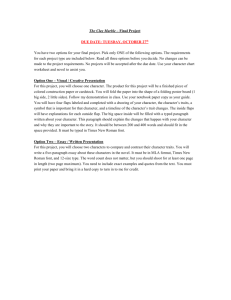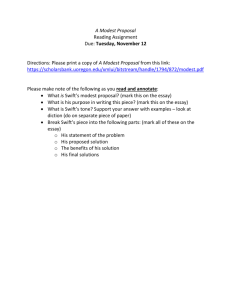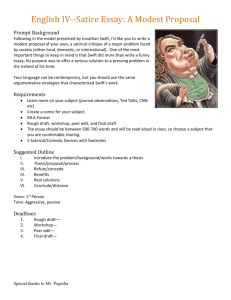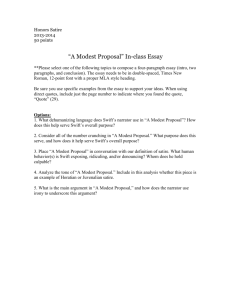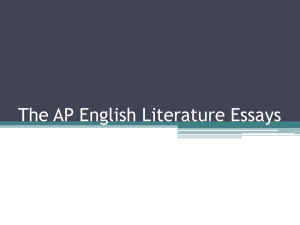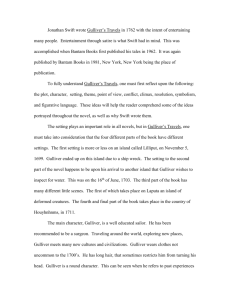Summer 2014 AP English Literature & Composition Walker, B
advertisement
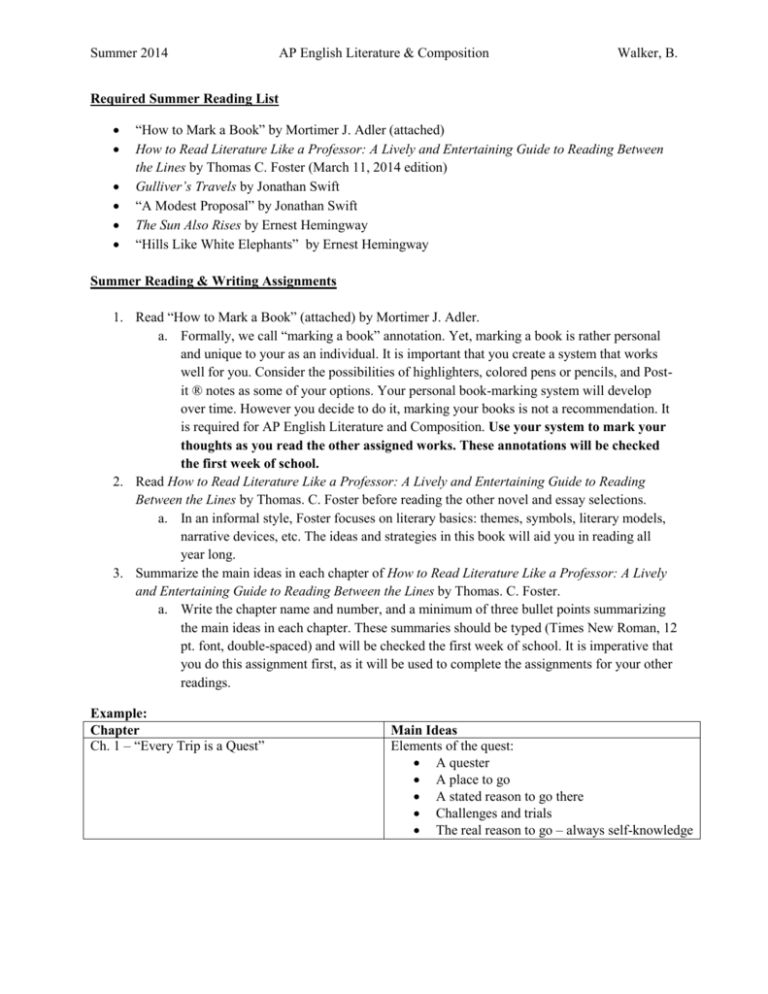
Summer 2014 AP English Literature & Composition Walker, B. Required Summer Reading List “How to Mark a Book” by Mortimer J. Adler (attached) How to Read Literature Like a Professor: A Lively and Entertaining Guide to Reading Between the Lines by Thomas C. Foster (March 11, 2014 edition) Gulliver’s Travels by Jonathan Swift “A Modest Proposal” by Jonathan Swift The Sun Also Rises by Ernest Hemingway “Hills Like White Elephants” by Ernest Hemingway Summer Reading & Writing Assignments 1. Read “How to Mark a Book” (attached) by Mortimer J. Adler. a. Formally, we call “marking a book” annotation. Yet, marking a book is rather personal and unique to your as an individual. It is important that you create a system that works well for you. Consider the possibilities of highlighters, colored pens or pencils, and Postit ® notes as some of your options. Your personal book-marking system will develop over time. However you decide to do it, marking your books is not a recommendation. It is required for AP English Literature and Composition. Use your system to mark your thoughts as you read the other assigned works. These annotations will be checked the first week of school. 2. Read How to Read Literature Like a Professor: A Lively and Entertaining Guide to Reading Between the Lines by Thomas. C. Foster before reading the other novel and essay selections. a. In an informal style, Foster focuses on literary basics: themes, symbols, literary models, narrative devices, etc. The ideas and strategies in this book will aid you in reading all year long. 3. Summarize the main ideas in each chapter of How to Read Literature Like a Professor: A Lively and Entertaining Guide to Reading Between the Lines by Thomas. C. Foster. a. Write the chapter name and number, and a minimum of three bullet points summarizing the main ideas in each chapter. These summaries should be typed (Times New Roman, 12 pt. font, double-spaced) and will be checked the first week of school. It is imperative that you do this assignment first, as it will be used to complete the assignments for your other readings. Example: Chapter Ch. 1 – “Every Trip is a Quest” Main Ideas Elements of the quest: A quester A place to go A stated reason to go there Challenges and trials The real reason to go – always self-knowledge Summer 2014 AP English Literature & Composition Walker, B. 4. Read “A Modest Proposal” and Gulliver’s Travels by Jonathan Swift. a. As you read, keep your notes from How to Read Literature Like a Professor close by and mark the ideas pointed out by Foster in your copy of the novel. 5. Create a Vocabulary List a. As you read the essay and novel, create a typed (Times New Roman, 12 pt. font, doublespaced) list of words you don’t recognize; define these words and include the page number on which the word appears in your book. “I couldn’t find anything to list” is not an acceptable excuse. No fewer than 20 words will be accepted for full points. 6. Apply the ideas from How to Read Literature Like a Professor: A Lively and Entertaining Guide to Reading Between the Lines to Gulliver’s Travels and “A Modest Proposal.” a. After you finish reading the novel and essay, apply the ideas from two chapters of Foster’s book to them. Focus on the question: How did the information in How to Read Literature Like a Professor help you understand the deeper layers of the novel and essay? b. Each response should include: The name of the chapter from How to Read Like a Professor An explanation of how these points helped your understanding of literary aspects of both the essay and the novel (which may include a discussion of theme, character, plot, symbol, irony, satire, setting, structure, tone, and/or point of view). c. Each response should be a minimum of 150 words typed (Times New Roman, 12 pt. font, double spaced, and include a word count). Both responses may be completed on the same sheet of paper. As with any assignment, all work should be completed on your own. Do not consult outside resources for assistance on your assignment. 7. Compose two essays based on prompts about Gulliver’s Travels and “A Modest Proposal.” a. From the novel and essay, you will compose two well-developed (i.e. hook, arguable thesis, topic sentences, direct citations and analysis, clear progression of argument, etc.) two-page MLA-formatted essays answering the following prompts: i. Gulliver’s Travels The relationship between the individual and society is a recurring theme throughout Western literature. At times, the individual is representative of the culture to which he or she belongs, while at other times the individual struggles against the constraints of that society. Write an essay in which you describe how Swift portrays the individual (Gulliver) in terms of his society. Quote directly from the text. Do not merely summarize the plot. ii. “A Modest Proposal” Examine how this proposal employs elements of reason and logic, traits admired by the Neoclassicists. Does this reason “turn them into lovers of peace and virtue?” In what sense is the proposal “modest”? Examine specific arguments in the proposal that are ironic. What is the tone of this irony? Is it for a “comic purpose”? 8. Read Ernest Hemingway’s The Sun Also Rises and “Hills Like White Elephants.” a. As you read, keep your notes from How to Read Literature Like a Professor close by and mark the ideas pointed out by Foster in your copy of the novel and short story. Summer 2014 AP English Literature & Composition Walker, B. b. Keep note of themes addressed in the texts. 9. Read over the attached abstract topic list. a. Narrow the list to five abstract topics that are relevant in The Sun Also Rises and “Hills Like White Elephants.” b. Narrow your list to a single topic for each reading. Write two one-page typed (Times new Roman, 12 pt. font, double-spaced) essays in which you describe the abstract topic that you have chosen and its relevance to the reading. Be specific and detailed about the connection of this topic to the novel and essay. 10. Create a works cited list. a. Create a works cited list using MLA format which includes all of the summer readings. Summer Reading and Writing Assignments Grading Rubric All work must be submitted in a clear-front report cover. Include a cover page with your NAME, ID NUMBER, TEACHER, COURSE, and TITLE in the middle of the page. All assignments must be submitted in order. Do not submit any pictures or decorations. The works cited list should be submitted as the last page in the report cover. NAME ID NUMBER TEACHER AP ENGLISH LITERATURE & COMPOSITION SUMMER 2014 READING AND WRITING ASSIGNMENTS Organization and Appearances __________/15 All items are submitted and in the proper format. The assignments are organized as specified and are typed as required (Times New Roman, 12 pt. font, double-spaced). Responses __________/15 The three responses (chapter summaries and two Swift responses, worth 5 points each) are insightful, reflective, and include all information assigned. They are easy to understand and show correct grammar, punctuation, and usage. Essays __________/40 The four essays over the four readings are insightful, reflective, and include all information assigned. They are easy to understand and show correct grammar, punctuation, and usage. Annotated Readings & Vocabulary List __________/30 The readings are thoroughly annotated and ideas from How to Read Like a Professor are noted (20 points). The vocabulary list of unrecognized words includes at minimum 20 words (10 points total, .5 point per word). Summer 2014 AP English Literature & Composition Walker, B. ABSTRACT TOPICS IN LITERATURE Ambition Fear Nature Alienation Free Will Oppression Beauty Freedom Order Beliefs Good v Evil Patriotism Betrayal Greed Peace Chaos Happiness Perseverance Circle of Life Hierarchy Power Communication Heroism Prejudice Conformity Home Pride Courage Identity Progress Culture Ignorance Racism Darkness Individuality Rebellion Death Injustice Rebirth Desire to Escape Inner Strength Relationships Disillusionment Isolation Sexism Displacement Jealousy Society Doubt Knowledge Suffering Dreams Language (as Identity) Survival Duty Light Struggle Empowerment Loneliness Temptation Everlasting Love Love Tradition Failure Loyalty Truth Faith Manipulation Values Family Relationships Materialism Violence Fate Nationalism War
